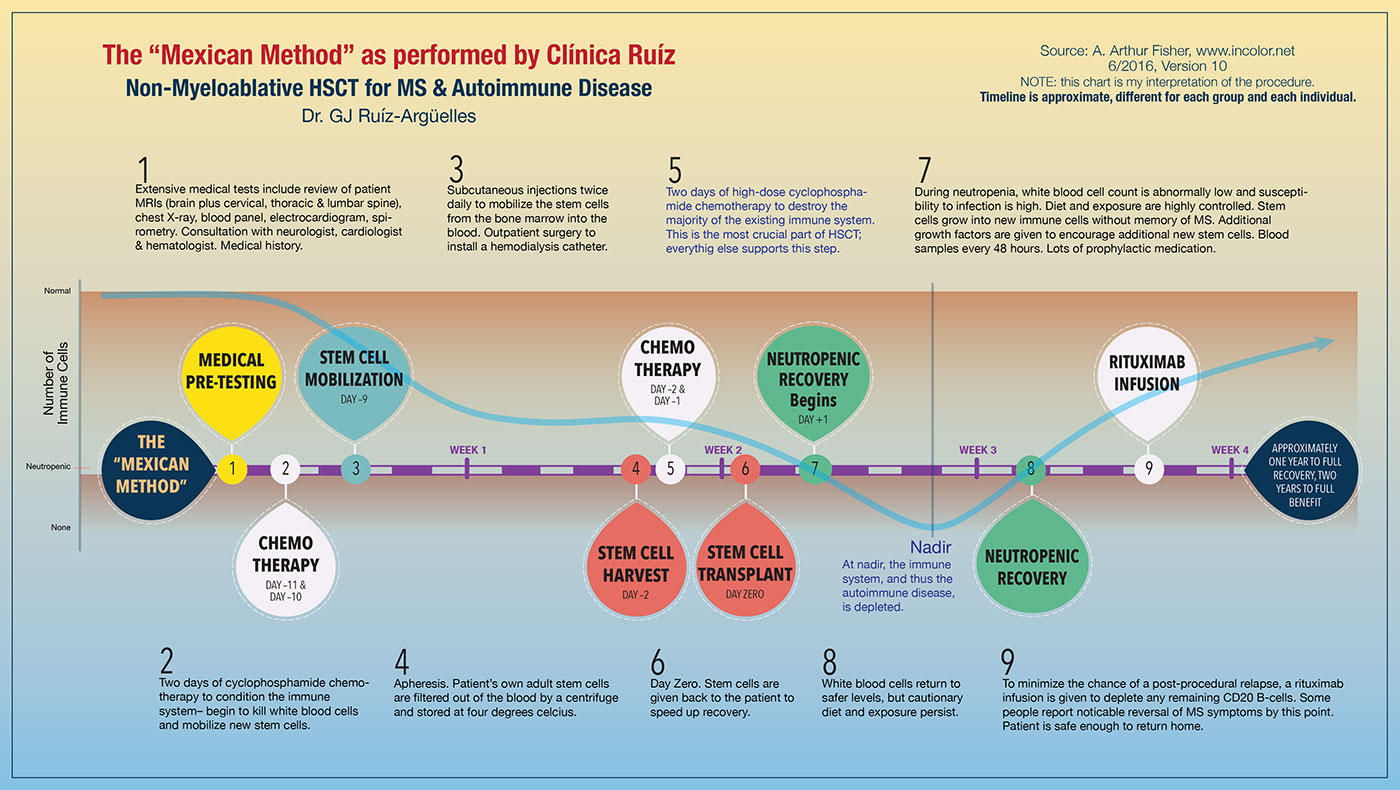MISSION STATEMENT
This website documents one man's quest to cure his MS through determination, perseverance and some luck.
Although harsh drugs and strict diet were successfully suppressing my devastating MS relapses, disease progression was quickly deteriorating my ability to walk and slowly deteriorating my ability to think. The logical solution for me was to try HSCT, which was not FDA-approved in the US (at least at the time of this writing), so I left the country to do it. This website documents my research and journey to effect a cure.
Time Since
Transplant:
8 Years 4 Months
No New Evidence of Disease-Related Activity on MRIs
AHSCT and Progressive MS. Conflicting Studies (Year 6.4) - UPDATED

UPDATED 23 December 2022
Two conflicting studies about HSCT and progressive MS have surfaced in the last two months. The first was an apropos article from Tomas Kalincik, PhD, of the Royal Melbourne Hospital in Australia in a late-breaking presentation at the 2022 meeting of the European Committee for Treatment and Research in Multiple Sclerosis (ECTRIMS). The second was by Matilde Inglese, MD, PhD, study author and professor of neurology at the University of Genoa, in Italy, which was published in Neurology on December 21, 2022.
Dr. Kalinck's Study
The presentation was regarding AHSCT and Progressive MS. Kalinick's findings have long since been suspected, yet there are definitely some high-profile cases that contradict this new research. My mentor, George Goss, mentioned throughout this blog, is one of them. Without George's detailed documentation of his experience, I might not have undergone my such treatment. (My own diagnosis at the time of my procedure was Relapsing MS.)
Check-In (Year 5.2)
I've been getting nudged to update this blog. I realize that I've been silent to an almost negligent degree. So sorry about that. I've been trying to move on from being "the guy who did the bone marrow transplant" to just being more of just some "guy."
Eight years ago, I saw myself as "the guy whose whole life changed due to a sudden medical problem." I bumped around for almost two years, constantly worsening until I was finally diagnosed with MS. Before the diagnosis, I surely thought I was going to die soon. When I was diagnosed, I had no idea what MS was, but at least I had new hope because now doctors could treat me, and hell, I had modern medicine to cure me. That new hope didn't last too long. Now I was being bounced around from drug to drug with little improvement. I thought now I was going to be kept alive longer while I continued to suffer.
Then I found HSCT as a real, potential solution. I had new hope. My title changed to "the guy who was going to go overseas to get a non-FDA-approved, experimental stem cell transplant." I held that title for only three months until, for a month, I became "the guy who's in Mexico getting a non-FDA-approved stem cell transplant." People made up their own reasons why the FDA hadn't approved this procedure. The most common misinformation I heard was that it was a moral issue due to the killing of a fetus or something like that. In the meantime, I suffered. I had to explain that my transplant was autologous and was still experimental in the US because of the mortality risk.
What is MS?

Updated March 31, 2018.
MS stands for Multiple Sclerosis, which basically means "many scars." The scars develop in the central nervous system (CNS), composed of the brain and spinal cord, as the result of an attack from the body's own immune system.
In a normal body, an attack of the CNS would still be a pretty awful thing, but the body would fight the attacking agents, clear away the resulting plaque, then begin to repair the damage. Sclerosis is a type of scar tissue that is atypical of a cleanly healed injury.
In people with MS, the immune system is stuck in fighting mode, commonly thought to be the result of high levels of inflammation in the body. This keeps the CNS stuck in defense mode, preventing normal healing of the damage. The attack is not the result of a typical virus or bacterial infection, it's actually the body's own immune system doing the damage. This process is referred to as "autoimmune" (immune system attacking the self). Dr. Stephen Gundry refers to this process as "friendly fire." There are a hundred or more different autoimmune diseases. Some of the most common ones are Graves' Disease, Hashimoto's Thyroiditis, Lupus, Type 1 Diabetes, Chron's Disease, Rheumatoid Arthritis and Multiple Sclerosis (MS).
Important Timeframes
- My Stem Cell Transplant Date: June 5th, 2016
- Treatment duration: 4 weeks
- Typical onset of disability reversal: +9 months
- Typical complete recovery from procedure: +1 to +2 years
- Typical maximum reversal of disability: +2 years
Disclaimer
I am not a doctor. I am a scientist (engineer) who has had MS since March 2013.
Explanation Video
This video explains HSCT in the words of one of the procedure's primary pioneers. If you do nothing else on this website, watch this presentation.
This video is a presentation made by Dr. Richard Burt, a leading pioneer of the HSCT for the autoimmune disease process. This is the single, most comprehensive description of what MS is and why HSCT is so important:
Note that I applied to Dr. Burt's clinical trial and was rejected as I hear most everyone is. He seems to want only people who get really sick, really fast but haven't been sick for terribly long.
Latest Blogs
- AHSCT and Progressive MS. Conflicting Studies (Year 6.4) - UPDATED
- Check-In (Year 5.2)
- No New Activity on MRIs (Year 3.6)
- Bloodwork Back To Normal (Year 3.3)
- Why Neurologists in the US Don't Recommend HSCT (Month +35.8)
- Better Pain Management (Month +33.6)
- Final Re-Vaccinations & The Medical Cannabis Primer (Month +32.9)
- "Sustained Decrease in Disability" (+30.6 months)
- No Progression Seen on MRI (Month +29.7)
- Cruising Along (Month +29)
- Nerve Decompression Surgery (Month +21.8)
- Looks Like It Worked (Month +17.2)
- Further Pain Improvements (Month +15)
- Significantly Lower Pain (Month +14.4)
- More Thoughts About MMJ, Meds & Pain (Month +13)
- +1 Years and Counting! (Month +12.6)
- Better & Better (Month +11.5)
- Major Pain Improvements. Finally. (Month +10.6)
- DIMS, SIMS and the Medicine Cabinet in the Brain (Month +9.6)
- Sliding Sideways ( Month +9.2)
- Pain, Pain, Go Away! (Month +8)
- Doctor: MS in Remission! (Month +6.75)
- Neuroplasticity (Month +6.1)
- Hopefully, My Last MRIs, Forever (Month +6)
- Chemobrain (Month +5.2)
- Kickin' and Screaming (Month +5)
- Month +3.7 Progress Report
- Fresh Foods Welcome! (Month +3.2)
- Thoughts About Pain (Month +3)
- Making Good Progress (Week +12)
- First Followup Rituximab Infusion scheduled (Week +9.5)
- Walking Towards Improvement (Day +54)
- Neutrophils Recovering Appropriately (Day +39)
- Less Pain Lately. Horray! (Day +25)
- The Highs & Lows of Recovery (Day +22)
- Homeward Bound (Day +12)
- Treatment Complete (Day +11)
- Final leg of the procedure (Day +10)
- Healing fast! (Day +8)
- Neutropenia (Day +6)
The Mexican Method - Protocol Diagram
Below is a timeline I created of the "Mexican Method," as performed by Clínica Ruíz. This protocol is a little different from that of Dr. Richard Burt and Dr. Shimon Slavin, who were the pioneers of this amazing process. As of this writing, this process is not yet FDA approved in the USA, but it is in a Stage 3 Clinical Trial.

The Mexican Method, illustration by A. Fisher version 10, updated 6/17/16 *Subject to Change!
Download as a PDF (1.83MB)